-
 bitcoin
bitcoin $87959.907984 USD
1.34% -
 ethereum
ethereum $2920.497338 USD
3.04% -
 tether
tether $0.999775 USD
0.00% -
 xrp
xrp $2.237324 USD
8.12% -
 bnb
bnb $860.243768 USD
0.90% -
 solana
solana $138.089498 USD
5.43% -
 usd-coin
usd-coin $0.999807 USD
0.01% -
 tron
tron $0.272801 USD
-1.53% -
 dogecoin
dogecoin $0.150904 USD
2.96% -
 cardano
cardano $0.421635 USD
1.97% -
 hyperliquid
hyperliquid $32.152445 USD
2.23% -
 bitcoin-cash
bitcoin-cash $533.301069 USD
-1.94% -
 chainlink
chainlink $12.953417 USD
2.68% -
 unus-sed-leo
unus-sed-leo $9.535951 USD
0.73% -
 zcash
zcash $521.483386 USD
-2.87%
What does it mean when the ADX trend strength indicator suddenly soars?
A sudden ADX surge in crypto signals strong trend momentum, but traders must confirm direction with +DI/-DI and volume to avoid false breakouts.
Jul 26, 2025 at 02:42 pm
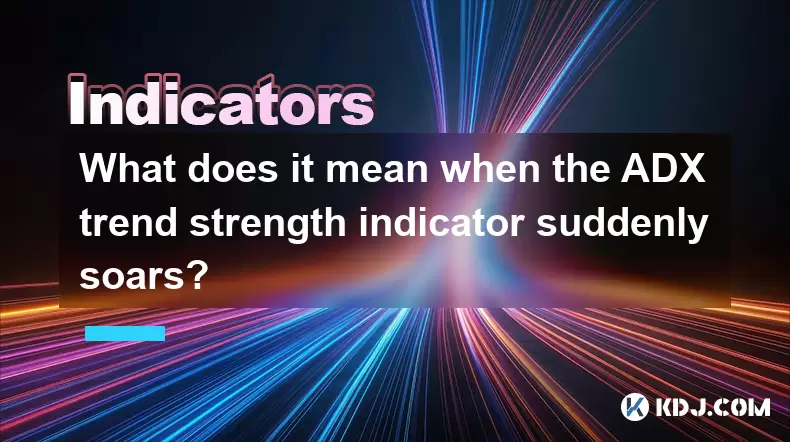
Understanding the ADX Indicator in Cryptocurrency Trading
The Average Directional Index (ADX) is a technical analysis tool used to measure the strength of a trend in financial markets, including the cryptocurrency space. It does not indicate the direction of the trend—whether upward or downward—but rather how strong the current trend is. The ADX value ranges from 0 to 100, with readings below 20 typically signaling a weak trend and values above 40 indicating a strong trend. When the ADX suddenly soars, it means that the market has transitioned from a period of consolidation or sideways movement into a phase of strong directional momentum. This surge is often observed during significant price breakouts or breakdowns, especially in volatile assets like Bitcoin or Ethereum.
What Triggers a Sudden ADX Surge in Crypto Markets?
A sudden increase in the ADX value can be attributed to several factors unique to the cryptocurrency ecosystem. One major cause is a sharp increase in trading volume, often triggered by macroeconomic news, regulatory updates, or whale movements. For instance, when a large institutional investor announces entry into a crypto asset, the resulting buying pressure can cause rapid price movement, leading to a rapid rise in ADX. Another factor is the breaking of key support or resistance levels, which can prompt algorithmic trading bots to initiate large-scale trades, amplifying directional momentum. Additionally, events like halvings, forks, or exchange listings can create strong sentiment shifts, contributing to accelerated trend formation and thus a spike in the ADX.
Interpreting the ADX Surge: Bullish or Bearish?
While the ADX measures trend strength, it does not distinguish between bullish or bearish trends. To determine the direction, traders must analyze the +DI (Positive Directional Indicator) and -DI (Negative Directional Indicator) lines in conjunction with the ADX. If the +DI crosses above the -DI at the same time the ADX surges, it suggests a strong upward trend is forming. Conversely, if the -DI crosses above the +DI during the ADX spike, it indicates a powerful downtrend. For example, during the 2021 Bitcoin bull run, the ADX climbed above 50 while the +DI remained dominant, confirming a robust upward movement. In contrast, during the May 2021 market crash, the ADX surged as the -DI overtook the +DI, signaling intense selling pressure.
How to Respond When ADX Suddenly Increases
When the ADX shows a sudden surge, traders should take specific steps to assess and act on the new market condition.
- Confirm the trend direction by checking whether the +DI is above the -DI (bullish) or vice versa (bearish).
- Verify price action by examining candlestick patterns near key levels—such as breakouts from consolidation zones or rejections at support/resistance.
- Check volume indicators like OBV (On-Balance Volume) or VWAP to ensure the surge is supported by strong participation.
- Adjust position size accordingly—strong trends often allow for trend-following strategies, but entering too late can expose traders to reversal risks.
- Set dynamic stop-loss levels based on recent volatility, such as using ATR (Average True Range), to protect gains during extended moves. Ignoring these steps may lead to false entries, especially in crypto markets where fakeouts are common.
Common Misinterpretations of ADX Spikes
Many traders misinterpret an ADX surge as a buy or sell signal in itself, which can lead to poor decisions. A high ADX value only confirms trend strength, not sustainability. For example, an ADX jumping to 60 during a parabolic rally in a meme coin like Dogecoin may reflect extreme momentum, but it could also signal an impending exhaustion. Markets often consolidate or reverse after such spikes. Another misconception is assuming that a rising ADX always leads to continued price movement. In reality, if the +DI and -DI begin to converge after the ADX peak, it may indicate weakening momentum despite the high ADX. Relying solely on ADX without context from RSI, MACD, or order book data can result in mistimed trades.Using ADX in Conjunction with Other Indicators
To maximize the utility of an ADX surge, it should be combined with complementary tools. - RSI (Relative Strength Index): Helps identify overbought (>70) or oversold (
- MACD (Moving Average Convergence Divergence): Confirms momentum shifts. A bullish MACD crossover alongside a rising ADX strengthens the case for a long position.
- Bollinger Bands: Can show whether price is at the upper or lower band during a trend, indicating potential overextension.
- Order Book Analysis: In crypto exchanges like Binance or Bybit, observing large buy walls or sell walls can validate whether the ADX surge reflects genuine market conviction. This multi-indicator approach reduces false signals and enhances decision-making precision.
Frequently Asked Questions
Can the ADX indicator predict reversals in cryptocurrency markets? The ADX itself does not predict reversals. However, when the ADX starts declining after a peak—especially if it drops below 40—it may suggest the trend is losing strength. Traders often watch for this as a potential early warning, but reversal confirmation requires additional signals like candlestick patterns or divergence in momentum indicators.Is a sudden ADX increase more reliable in high-cap or low-cap cryptocurrencies?High-cap cryptocurrencies like Bitcoin or Ethereum tend to exhibit more reliable ADX surges due to higher liquidity and less manipulation. In low-cap altcoins, ADX spikes can be caused by pump-and-dump schemes or whale activity, making them less trustworthy without volume and on-chain confirmation.
Should I enter a trade immediately when the ADX spikes?Immediate entry is risky. It's better to wait for confirmation through price closing above/below key levels, DI crossovers, or volume spikes. Entering during a retest of a broken resistance (now support) after the ADX surge improves risk-to-reward.
How often does the ADX give false signals in crypto trading?False signals occur frequently in low-volume or highly volatile altcoins. During news-driven volatility, ADX may spike temporarily without sustained trend follow-through. Combining ADX with volume analysis and time frame alignment (e.g., checking daily and 4-hour charts) reduces false positives.
Disclaimer:info@kdj.com
The information provided is not trading advice. kdj.com does not assume any responsibility for any investments made based on the information provided in this article. Cryptocurrencies are highly volatile and it is highly recommended that you invest with caution after thorough research!
If you believe that the content used on this website infringes your copyright, please contact us immediately (info@kdj.com) and we will delete it promptly.
- NYC Reacts: Bitcoin Price Sees Sharp BTC Fall, Fueling Market Uncertainty
- 2026-02-06 13:20:01
- CME Coin Ignites Wall Street's Tokenized Finance Revolution: A New Era Dawns
- 2026-02-06 13:20:01
- Bitcoin Price, BTC Level, USD Now: Navigating Today's Volatile Crypto Landscape
- 2026-02-06 13:15:01
- Bitcoin's Big Apple Rollercoaster: Live Market Tumbles, USD Value in Flux
- 2026-02-06 13:15:01
- Iris Energy and the Bitcoin Mining Maze: A Q4 Revenue Shortfall Signals Industry Headwinds
- 2026-02-06 13:10:02
- Crypto's Chilly Reception: Bitcoin Plunge Pinches Iren's Pockets as AI Heats Up
- 2026-02-06 12:50:02
Related knowledge
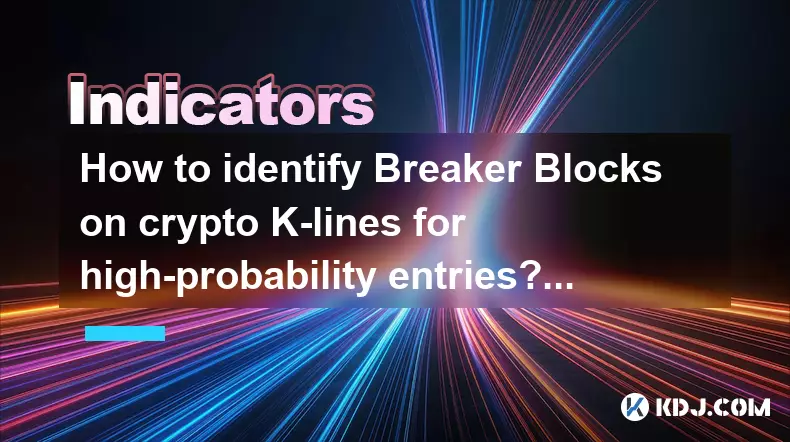
How to identify Breaker Blocks on crypto K-lines for high-probability entries? (SMC Strategy)
Feb 06,2026 at 01:20pm
Understanding Breaker Blocks in SMC Context1. Breaker Blocks emerge when institutional orders reject a prior market structure, creating visible imbala...
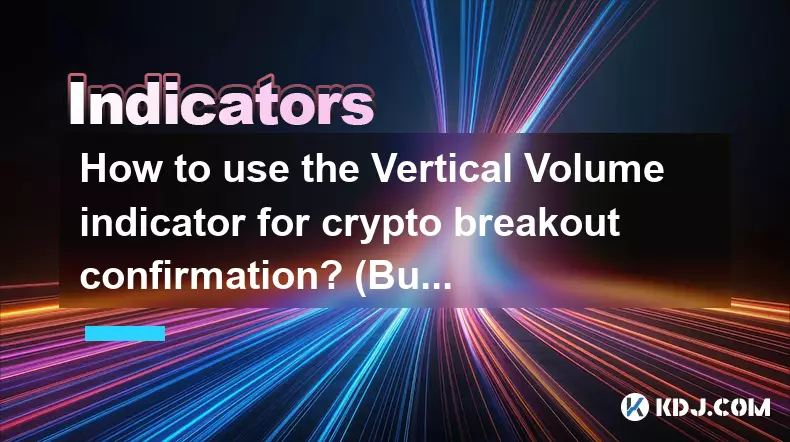
How to use the Vertical Volume indicator for crypto breakout confirmation? (Buying Pressure)
Feb 05,2026 at 04:19am
Understanding Vertical Volume in Crypto Markets1. Vertical Volume displays the total traded volume at specific price levels on a chart, visualized as ...

How to identify "Hidden Bullish Divergence" for crypto trend continuation? (RSI Guide)
Feb 04,2026 at 05:19pm
Understanding Hidden Bullish Divergence1. Hidden bullish divergence occurs when price forms a higher low while the RSI forms a lower low — signaling u...
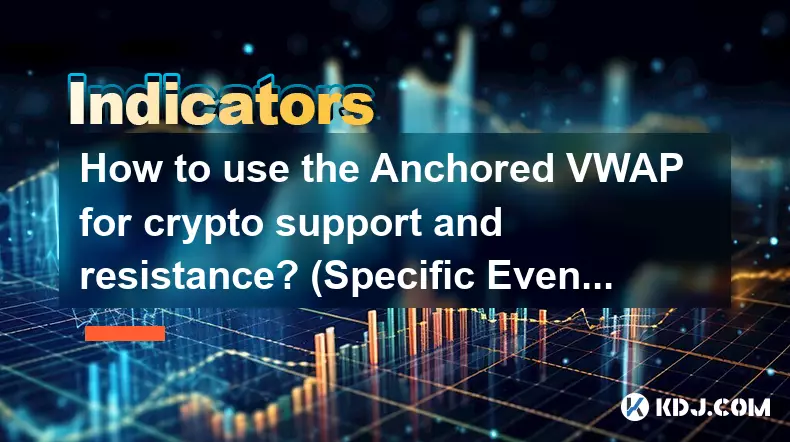
How to use the Anchored VWAP for crypto support and resistance? (Specific Events)
Feb 05,2026 at 01:39am
Anchored VWAP Basics in Crypto Markets1. Anchored Volume Weighted Average Price (VWAP) is a dynamic benchmark that calculates the average price of an ...
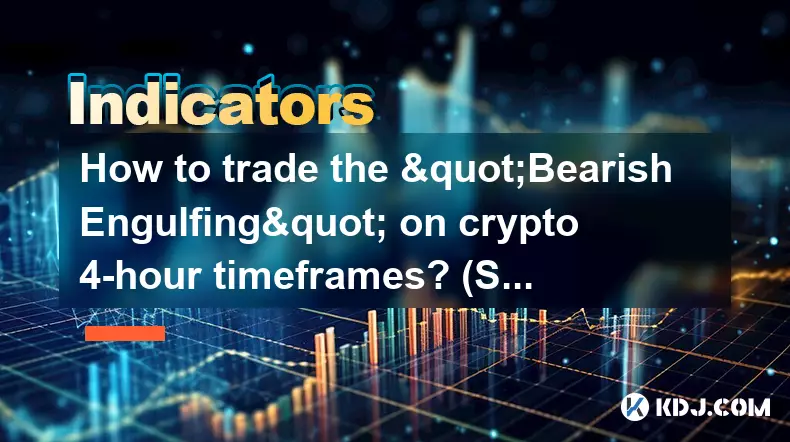
How to trade the "Bearish Engulfing" on crypto 4-hour timeframes? (Short Setup)
Feb 04,2026 at 09:19pm
Bearish Engulfing Pattern Recognition1. A Bearish Engulfing forms when a small bullish candle is immediately followed by a larger bearish candle whose...
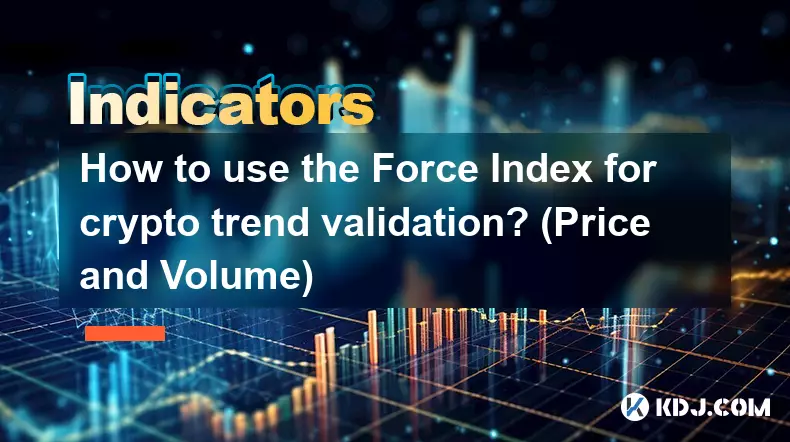
How to use the Force Index for crypto trend validation? (Price and Volume)
Feb 04,2026 at 10:40pm
Understanding the Force Index Fundamentals1. The Force Index measures the power behind price movements by combining price change and trading volume in...

How to identify Breaker Blocks on crypto K-lines for high-probability entries? (SMC Strategy)
Feb 06,2026 at 01:20pm
Understanding Breaker Blocks in SMC Context1. Breaker Blocks emerge when institutional orders reject a prior market structure, creating visible imbala...

How to use the Vertical Volume indicator for crypto breakout confirmation? (Buying Pressure)
Feb 05,2026 at 04:19am
Understanding Vertical Volume in Crypto Markets1. Vertical Volume displays the total traded volume at specific price levels on a chart, visualized as ...

How to identify "Hidden Bullish Divergence" for crypto trend continuation? (RSI Guide)
Feb 04,2026 at 05:19pm
Understanding Hidden Bullish Divergence1. Hidden bullish divergence occurs when price forms a higher low while the RSI forms a lower low — signaling u...

How to use the Anchored VWAP for crypto support and resistance? (Specific Events)
Feb 05,2026 at 01:39am
Anchored VWAP Basics in Crypto Markets1. Anchored Volume Weighted Average Price (VWAP) is a dynamic benchmark that calculates the average price of an ...

How to trade the "Bearish Engulfing" on crypto 4-hour timeframes? (Short Setup)
Feb 04,2026 at 09:19pm
Bearish Engulfing Pattern Recognition1. A Bearish Engulfing forms when a small bullish candle is immediately followed by a larger bearish candle whose...

How to use the Force Index for crypto trend validation? (Price and Volume)
Feb 04,2026 at 10:40pm
Understanding the Force Index Fundamentals1. The Force Index measures the power behind price movements by combining price change and trading volume in...
See all articles










































































